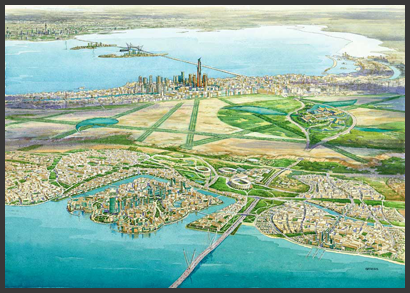Strong Recovery of Kuwait Economy
Kuwait plans to spend about 16 billion dinars (US$56bn) in the fiscal year starting April 1, 2010 one-third more than the current year as oil prices rise. The emirate, which expects to spend 12.1 billion dinars in the current fiscal year, posted a budget surplus of 2.74 billion dinars last year as it benefited from higher oil sales.
Phoenix from the ashes
With its five-year-plan, Kuwait aims to not only boost its economy , but to raise the level of society. Sheikh Sabah’ vision is of a society of well-educated, religiously respected, and family-oriented people. He does not believe that that modernization will drive back religion and tradition, as has happened in the West. In the Gulf countries Islam is an integral part of the daily life. The religion of Islam is based on “Deen wa Daula” which means religion and state. Both are integral in character to Islamic society and cannot be separated.

Kuwait plans to spend about 16 billion dinars (US$56bn) in the fiscal year starting April 1, 2010 one-third more than the current year as oil prices rise. The emirate, which expects to spend 12.1 billion dinars in the current fiscal year, posted a budget surplus of 2.74 billion dinars last year as it benefited from higher oil sales.
Kuwait, with a total population of 3.44m people, produces more oil per day than Algeria and Indonesia together.
Blessed with black gold and direct access to the Persian Gulf for shipping, its GDP per capita stands at US$55,800, one of the highest in the world. But this figure did not shield the country from the impact of the global crisis.
As did other funds in the world, the Kuwait Fund for Arab Economic Development suffered. Al-Bader:
“The Kuwait Fund suffered from the effects in both 2007-2008 and 2008-2009. For 2009-2010 (ending in March 2010), the effect is minimal compared to our resources and it has not affected our operation.
In fact, if you look at our accounts we are reaching our targets as set by the board of directors. Overall, the Kuwait Fund is affected just like everyone else by the recent financial crisis, but we are hoping by the end of 2009-2010 we will be going back to our 2007 levels.”
However, Al-Bader is optimistic about the future:
“I see the Kuwait Fund as still maintaining its strong position in the region. It has been in existence for 48 years and in 2011 we will be celebrating our 50th anniversary. Hopefully with what my predecessors have established. and with what I plan to do with my colleagues, the Kuwait Fund will continue to thrive.”